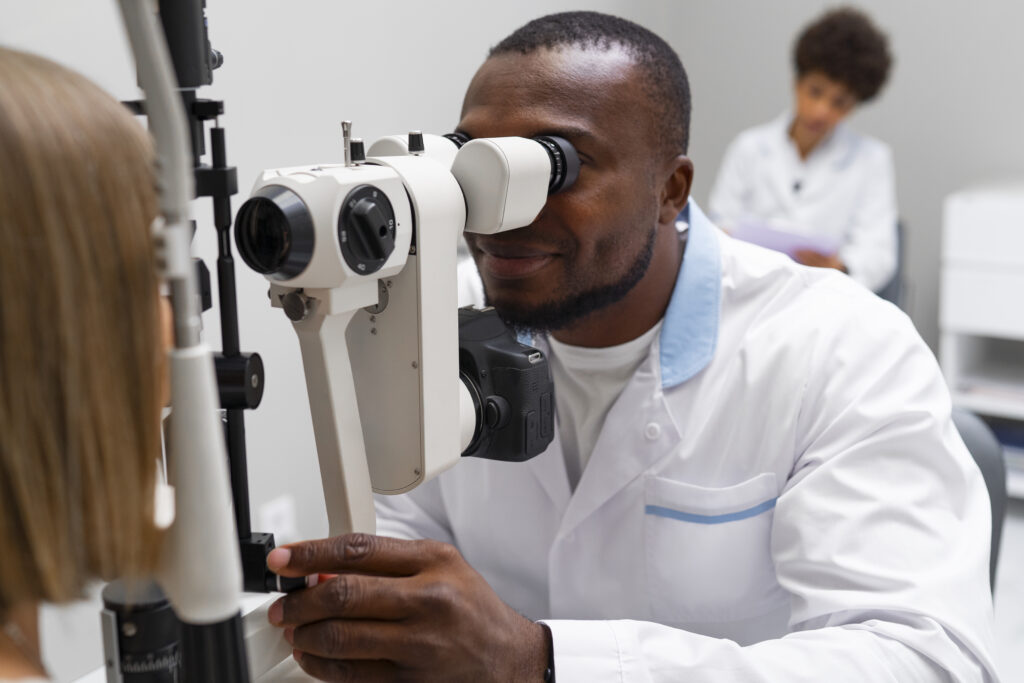On the eve of Labor Day, when most Kenyans were winding down in anticipation of rest and celebration, I underwent a delicate and intricate eye procedure. As I lay on the theater’s operating table, anxiety briefly held me captive. Yet, reassurance soon replaced my apprehension as the gentle voice of Dr. Karego, a dedicated and compassionate ophthalmologist, calmed my nerves. During our pre-operative conversation, she shared insights that shocked and inspired me to research further.
Dr. Karego mentioned, almost casually, that Kenya has fewer than 120 ophthalmologists. Indeed, deeper research later revealed an even graver picture: Kenya has approximately 115 ophthalmologists serving a rapidly expanding population estimated at 57.3 million in 2025 by the World Population Review. This places the national ratio at roughly one ophthalmologist per 420,000 people, starkly below the World Health Organization’s recommended ratio of one ophthalmologist per 250,000 individuals. The situation worsens in rural areas, with one ophthalmologist often serving up to three million people (University of Nairobi Ophthalmology Department, 2025). Interestingly, as of the most recent data, Thailand, with a reported population of about 70 million people, has approximately 1.52 ophthalmologists per 100,000 people.
Even more concerning in Kenya is that out of these 115 ophthalmologists, fewer than 12, like Dr. Karego, have specialized further in critical areas such as retina and pupil surgery. With diabetes becoming increasingly prevalent, affecting approximately 2,578,500 adults or 4.5% of Kenya’s population according to labtestzote.com (2024), the demand for specialists to manage diabetes-related complications, such as diabetic retinopathy, has surged dramatically. Approximately 11% of diabetic patients in Kenya develop diabetic retinopathy, a condition that, if untreated, can lead to irreversible vision loss, according to PubMed Central (2023).
Without a doubt, this scarcity of specialized care has a troubling ripple effect: it inevitably invites an increase in unqualified or “quack” doctors. Patients desperate for treatment often fall victim to these fraudulent practices, exacerbating their conditions and frequently resulting in permanent vision loss. The proliferation of quacks underscores the urgency for stringent policy measures and the training of more genuine specialists.
Reflecting on these troubling realities, I am reminded of the late Dr. Amos Kibata, a dedicated ophthalmologist and a personal friend whose passion for retina care and unwavering commitment deeply touched countless lives. His recent passing has intensified the gap in Kenya’s ophthalmology sector, vividly reminding us of the indispensable role such devoted professionals play in preserving our precious eyesight.
Accordingly, Kenya must urgently embrace actionable policy solutions to address this growing crisis. Firstly, the government should increase investment in medical education, particularly by offering scholarships and incentives explicitly aimed at ophthalmology and its crucial subspecialties. Training specialists like vitreoretinal surgeons is costly and demands prolonged commitment, which deters many capable medical practitioners. Government-backed incentives can significantly ease these burdens.
Secondly, establishing robust public-private partnerships can substantially lower the financial barriers of setting up specialized eye care centers. Such collaborations would allow for the acquisition of state-of-the-art equipment, thus enabling broader and more equitable access to critical eye care services.
The Ministry of Health must also implement stringent regulations to combat medical quackery. Strengthening oversight and regulatory mechanisms is vital to safeguard the public from dangerous, unqualified practitioners.
Finally, we must foster a culture of appreciation and proactive responsibility towards all our healthcare professionals. We must regularly celebrate doctors who tirelessly dedicate their lives to saving our sight and well-being, often working long hours under challenging conditions. By prioritizing investments in healthcare infrastructure and specialized training, we collectively affirm our commitment to public health.
My personal experience and conversations with dedicated doctors like Dr. Karego have underscored a profound truth: eyesight is an invaluable asset, defining the quality of life. Let us invest wisely and proactively in our vision. In honoring and supporting Kenya’s few but mighty eye specialists, we pave the way towards a healthier, brighter future for all.
Think green, act green!



